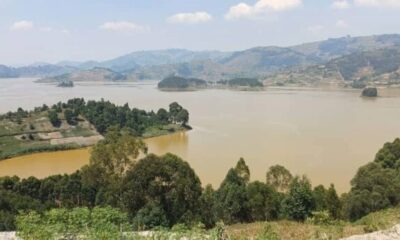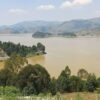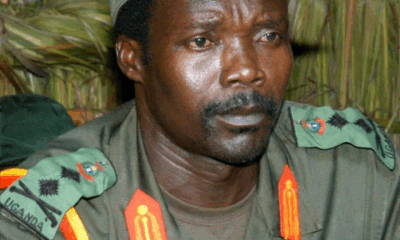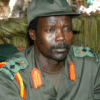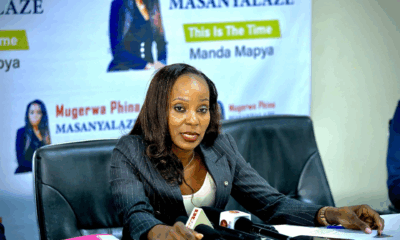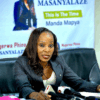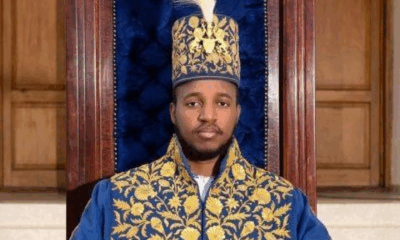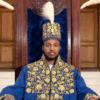News
Fear, Obstruction and the Umbrella The enduring legacy of 2021 elections
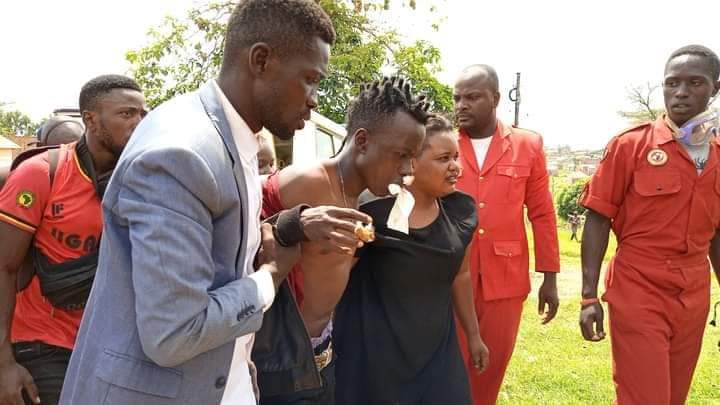
Bobi helps producer Dan Magic after he was injured by security forces at a rally in Kayunga
It had been billed as a scientific election, one in which candidates and voters were expected to interact electronically or virtually though radio and television or through the use of social media platforms.
Alas. The 2021 electoral campaigns have turned out to be the most violent, that Ugandans have ever experienced. They’ve also been the least transparent.
The campaigns for President kicked off in November 2020 amid stringent regulations by the Electoral Commission against holding of rallies. Opposition politicians criticized the regulations including the requirement of registering participants to attend a meeting, as simply unrealistic and unfair to the candidates and the voters, some of whom wished to catch a glimpse of the candidates in order to make an informed decision.
Opposition candidates continued to disregard the arbitrary orders, especially since they were not backed by any law, as a witch hunt against them. They routinely complained that the law enforcement agencies – led by police, turned a blind eye on the ruling party’s Violations of the same rules.
As many pointed out, the enforcement of the same rules was politically motivated and aimed to prevent the opposition from reaching out to the masses.
The opposition questioned why the government was keen to stop political gatherings by opposition leaders and not other types of gatherings such as religious, business gatherings such as in markets and in Kikuubo or even those convened by Museveni’s supporters.
Day after day, the crowds continued to grow to the level that the government was getting uncomfortable with, or perhaps envious with.
While campaigning in Luuka district of Busoga sub-region, leading presidential contender Kyagulanyi Robert Ssentamu was arrested, bundled into the police’s mobile prison and arrested in the infamous Nalufenya police prison.
Although he was later released, his arrest sparked off some protests and burning of tyres in Kampala, Mbale, Mityana and other towns across Uganda.
The security forces moved with blistering speed and might to end the riots. At the end of counting, more that 80 people had lost their lives from the November 18 riots. President Museveni appeared on TV and accepted that security forces who had been seen dressed in informal clothes, had killed 20 innocent people. He apologized on their behalf but warned that the army would not tolerate threats of riots whenever someone gets arrested.
The murder of over 80 people in Kampala including children and women, had a chilling impact on millions of Ugandans many of whom started to draw parallels between the massacres of past regimes and the murders that had been committed.
Opposition politicians refused to succumb to what they called obstruction tactics by the government. They pushed ahead with more rallies in Kaseese. Even there, Police and security agencies knocked supporters to death.
The refusal by the Electoral Commission to put the incumbent Yoweri Museveni to the same standards of for example not gathering crowds, deepened the sense of injustice and partiality in the minds of many voters.
The death of Frank Ssenteza Kalibbala, who was one of Kyagulanyi’s body guards at Busega roundabout, allegedly at the hands of the military, shortly after Kyagulanyi’s cameraman Ashraf Kasirye in Kitovu Masaka, shook many to their core.
Other candidates such as Forum for Democratic Change presidential flag bearer have equally been sprayed with tons of tear gas, denied to speak to supporters and spent nights in police cells.
With the support of cultural and religious leaders, the opposition concluded that they would not bend to the government’s sabotage tactics.
They were perhaps vindicated when, after President Museveni was declared winner of the elections, he abandoned his own SOP medicine, when he held victory parade all the way from his home area of Kiruhuura to the constitutional square in Kampala.
The cumulative effect of these various types of obstruction, killings and verbal threats by the President and his men, is that they’ve instilled an unbelievable degree of fear in the population.
On hindsight, however, some believe that by suppressing the opposition, the government actually mobilized for Kyagulanyi.
By Monday January 10, three days to the presidential polling day, hundreds of thousands of people were boarding buses and taxies running away to their villages.
Some in the security circles promoted the view that the opposition was preparing to burn Kampala in case they lost. They used this to deploy heavily in the city and surrounding areas of Wakiso and Mukono.
The display of military might by moving armored personnel carriers in downtown Kampala, or long columns of armed soldiers has done little to reassure the public that all is well.
Obstruction of Journalists
The Uganda Media Council, which is domiciled by the Uganda Communications Commission, proved to be another tool of obstruction against the realisation of free and fair elections when it directed that only those journalist that they had accredited allowed be allowed to cover the elections.
Hundreds if not thousands of reporters for international media organizations were denied accreditation.
Although this was later rescinded, two days to elections, it nonetheless passed as a move by the government to evade the prying eyes of Ugandans.
Four time presidential contender Dr. Kizza Besigye remarked that a situation that is characterised with fear, obstruction cannot yield a free and fair outcome.
Closure of bank accounts of civil society
The Bank of Uganda working with the Financial Intelligence Authority (FIA) have during the recent months ordered the closure of bank accounts belonging to Civil Society Organizations.
Renowned human rights defender Nicholas Opiyo spent Christmas holiday in Kitalya jail on charges of money laundering, after his organisation’s account was raided.
In a joint statement that was signed by 14 of Uganda’s biggest donor partners, the envoys of those countries decried the abuse of the law by state operatives who kept Opiyo for several hours without charging him.
Obstruction of observers
After months of keeping election observers guessing, the Electoral Commission this week released a scaled down list of election observers. According to the U.S Ambassador to Uganda Natalie Brown, they were given just 25 percent of the applications for voter observation that they had submitted.
On January 12, Ambassador Brown issued a statement noting that they because of their inability to secure the numbers for observation they had requested, the US embassy was counselling its election observation mission for the 2021 elections.
But she didn’t leave without warning that the decision by EC risks discrediting the outcome of the election.
Ambassador brown said in a statement:
“The purpose of a diplomatic observation of elections is to demonstrate our interest in a free, fair, peaceful, and inclusive electoral process. Diplomatic observers are not participants or advisors in the electoral process. Rather, they informally observe the conduct of elections, following strict standards of impartiality, non-interference, and compliance with local laws. The Government of Uganda has supported such U.S. observer efforts in multiple previous Ugandan elections. This makes the decision now to deny accreditation to all but a small, randomly selected handful of our observers all the more troubling.”
We are further concerned by reports that the Electoral Commission has denied accreditation requests from members of other diplomatic missions and large numbers of Ugandan observers.
Numerous civil society organizations planned to observe the elections, but many have not heard back from the Electoral Commission on their accreditation applications. Among those civil society organizations which already had organizational accreditation, the vast majority of their individual observers have not yet – two days ahead of elections – received accreditation badges.Absence of robust participation of observers, particularly Ugandan observers who are answerable to their fellow citizens, Uganda’s elections will lack the accountability, transparency and confidence that observer missions provide. Uganda will also miss the opportunity to benefit from observers’ insights to improve and inform future elections.
Blocking social media
President Museveni has done many things including speaking like Gheto kids, opening up communication links with them through social media platforms.
But the the president was so annoyed by the blocking of over 500 Facebook accounts that were being run by his team with the aim of influencing the election, that he ordered UCC to block all social media platforms by UCC.
The number of obstructions faced by opposition politicians, journalists, civil society and the general population such as the directive against them to observe the election outside the polling station, has fomented fear that the people’s voice will not be respected, thereby undermining the constitution which gives the right to leadership by only those that win elections.
Statement by U.S. Ambassador Natalie E. Brown on Cancellation of U.S. Diplomatic Observer Mission of Uganda’s Elections
It is with profound disappointment that I announce U.S. Mission in Uganda’s decision to cancel our diplomatic observation of Uganda’s January 14 elections due to the decision by the Electoral Commission of Uganda to deny more than 75 percent of the U.S. election observer accreditations requested. With only 15 accreditations approved, it is not possible for the United States to meaningfully observe the conduct of Uganda’s elections at polling sites across the country.
Despite multiple requests, the Electoral Commission provided no explanation for its decision, which it communicated mere days before the elections. The purpose of a diplomatic observation of elections is to demonstrate our interest in a free, fair, peaceful, and inclusive electoral process.
The January 14, poll was not just a polling day. It was the culmination of more than three months of a bitter political fight between a 35 year old government and a generation of mostly young people who wanted to chart a new direction for their country. The challengers had registered their party and symbols.
Seeing how the young men and women had stood up against oppression and unbelievable intimidation, the Umbrella, which was the symbol of the NUP therefore became the symbol of change. At the end of counting, NUP had swept aside all of Museveni’s ministers in Buganda and had given Kyagulanyi incredible strength.
The incumbent NRM leader came out seithing with anger on January 16, and declared that the Baganda who had voted overwhelmingly for Kyagulanyi, were tribalistic. He was called out by many people and he has never repeated it
Comments



